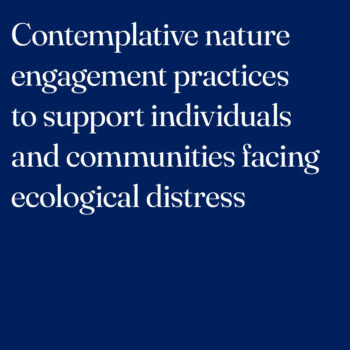
University of Melbourne researchers have recently partnered with practice experts of diverse contemplative practices to provide a practice guide – Contemplative nature engagement practices to support individuals and communities facing ecological distress. Aimed at group leaders and teachers working with people experiencing eco-distress, this resource bridges scientific understanding and contemplative wisdom to foster adaptive responses in the face of ecological change.
The guide provides information on how to assist individuals and groups facing climate and ecological crises and how to adaptively respond to”eco-distress” including a range of feelings. The guide builds on academic research to identify three key dimensions of adaptative responses to ecological change. The guide focuses on practices using five types of contemplative nature engagement to encourage healthy outcomes for individuals, communities, and the natural world.
The guide is targeted to assist group leaders, teachers, community leaders, and practitioners.
Contemplative nature engagement practices to support individuals and communities facing ecological distress is available for download from the University of Melbourne website.
Citation: Macaulay, R., Joyce, C., Jones, S., Johnson, K., Lanyon, A., McCawley, B., Martin, S., Rhydwen, M., Rowntree, C., Stone, J., Thomas, J. M., Vella-Brodrick, D., Walker, I., Ward, M., and Williams, K. (2023). Contemplative nature engagement practices to support individuals and communities facing ecological distress. School of Agriculture, Food and Ecosystem Sciences, The University of Melbourne.



